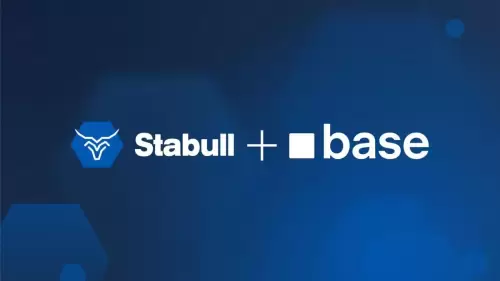 |
|
 |
|
 |
|
 |
|
 |
|
 |
|
 |
|
 |
|
 |
|
 |
|
 |
|
 |
|
 |
|
 |
|
 |
|
Cryptocurrency News Articles
Bitcoin (BTC) Is Entering a New Era; One That Could Fundamentally Defy Past Expectations
May 24, 2025 at 11:03 am
Bitcoin (BTC) is stepping into what many observers are calling a new era; one that could fundamentally defy past expectations and reshape its very role within the global financial system.

Bitcoin (BTC) is stepping into what many observers are calling a new era; one that could fundamentally defy past expectations and reshape its very role within the global financial system.
After years of anticipation and speculation, key political changes, pivotal regulatory shifts in the U.S., and surging institutional interest are now converging to push Bitcoin towards genuine mainstream adoption.
Investors who are only watching the day-to-day price swings might just be missing the bigger picture: Bitcoin is steadily embedding itself into the fabric of the global economy. As crypto investor James Lavish recently put it, what happens next for Bitcoin won’t just be another price rally, it could very well be a deep “structural transformation.”
Key Regulatory Green Lights: GAAP, SAB 121 Changes Unlock Bitcoin Adoption
A recent shift in the U.S. administration has seemingly paved the way for major adjustments in how Bitcoin is treated under federal regulations, providing significant tailwinds. One of the most impactful of these changes is the crucial update to GAAP (Generally Accepted Accounting Principles) accounting standards.
Publicly traded companies in the U.S. can now mark Bitcoin holdings to market on their balance sheets, treating it much like other traditional financial assets. This seemingly technical accounting change is a game-changer because it eliminates the previous financial disincentives—like impairment charges without upward revaluation—that made corporate treasurers understandably hesitant to hold Bitcoin. It’s viewed as a key unlock for broader adoption by Fortune 500 firms and other large corporations.
Moreover, the reversal of the controversial SAB 121 rule by the SEC allows banks to hold Bitcoin as an asset. Previously, they had to treat it as a liability. This update significantly reduces compliance friction.
Now, banks can integrate Bitcoin into their offerings without the looming fear of regulatory audits. As a result, more traditional financial players are expected to build Bitcoin-related products and services.
Related: New “Buy-The-Dip” Signal Emerges On Bitcoin’s Chart, Boosts Bullish Momentum
Wall Street Warms Up: Major Banks Now Offer Bitcoin Access
Institutional resistance is quickly fading. Financial giants such as Chase, Citibank, and Wells Fargo are now positioned to offer Bitcoin access to their customers. This is a massive shift from the previous landscape where banks viewed Bitcoin as a competitor. Now, they see it as a profit center. When traditional banks benefit, their narrative around Bitcoin changes from caution to encouragement.
Besides just offering access, banks are preparing to equip their sales staff with tools and training. This will help them guide clients through Bitcoin investments confidently. It’s a smart strategy helping demystify Bitcoin while boosting revenue streams.
The Rise of Self-Custody: Investors Seek Control Amidst Mainstream Push
While institutional interest and bank-led initiatives are making Bitcoin more accessible to the masses, a parallel trend is seeing individual investors increasingly seek direct control and sovereignty over their digital assets. Self-custody solutions, particularly hardware wallets like the Coldcard wallet, are reported to be growing in popularity.
Related: Glassnode Reveals Shocking Drop in Bitcoin Profit-Taking Despite All-Time Highs
Products like Coldcard, designed specifically with Bitcoiners in mind, offer robust security features for individuals who prefer to manage their own private keys. As more people adopt Bitcoin, promoting safe and effective self-custody practices is becoming an essential part of the ecosystem’s maturation.
This dual approach—easier institutional access alongside robust self-sovereignty tools—is shaping Bitcoin’s new era. It could be an era defined not by a single narrative, but by the convergence of different perspectives, ultimately pushing Bitcoin closer to the mainstream.
Disclaimer:info@kdj.com
The information provided is not trading advice. kdj.com does not assume any responsibility for any investments made based on the information provided in this article. Cryptocurrencies are highly volatile and it is highly recommended that you invest with caution after thorough research!
If you believe that the content used on this website infringes your copyright, please contact us immediately (info@kdj.com) and we will delete it promptly.






























































